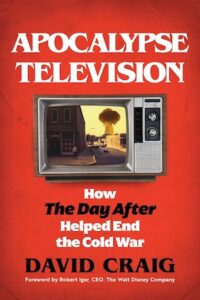 (Applause Books, November 2023)
(Applause Books, November 2023)
On November 20, 1983, American viewers witnessed an unprecedented television event: a three-hour, made-for-TV movie about a nuclear attack on the nation’s heartland. Broadcast only after months of culture warring, political jockeying, and corporate maneuvering, The Day After marked a watershed moment in the history of the arms race, delivered at the peak of network television’s reach, before cable, streaming, and social media atomized audiences. To this day, it remains the highest-rated television movie ever.
As David Craig recounts in Apocalypse Television, however, the film almost never aired at all. The brainchild of ABC executive Brandon Stoddard, it courted controversy from the outset, with Stoddard’s colleagues aghast at the idea of realistically depicting a nuclear strike. Even once the movie was greenlit, battles continued behind the scenes, inside the edit room, and between network executives and the production’s young, brash director. But these skirmishes paled in comparison to the cultural and political conflict that the film inspired, with antinuclear activists pitted against neoconservatives, the Religious Right, and the White House, which mounted a full-throttled propaganda campaign aimed at hijacking the film’s message. Nonetheless, it reached millions of viewers abroad and at home, including Ronald Reagan himself, whose policies and rhetoric toward the Soviet Union would soon shift significantly.
Featuring a cast of Hollywood creatives, political operatives, rogue publicists, and the residents of Lawrence, Kansas, this is a dramatic account of storytellers harnessing the most powerful medium of the day to advance their cause and avert a dystopian future in the face of tremendous personal and commercial risk.
David Craig is a Clinical Professor at the University of Southern California in the Annenberg School at the University of Southern California. He is one of the world’s leading scholars of the “emerging creator” industries, marked by social media entrepreneurs and influencers harnessing global platforms. Craig has been cited in major outlets including the New York Times, Los Angeles Times, USA Today, Hollywood Reporter, Vox, CNN, Bloomberg, and NBC News. Prior to his academic career, he was a multiple Emmy-nominated Hollywood producer and cable television executive involved in over thirty projects, from feature films to television programs, web series and stage productions. His television projects garnered critical acclaim and were nominated for over seventy Emmy, Peabody, and Golden Globe awards.